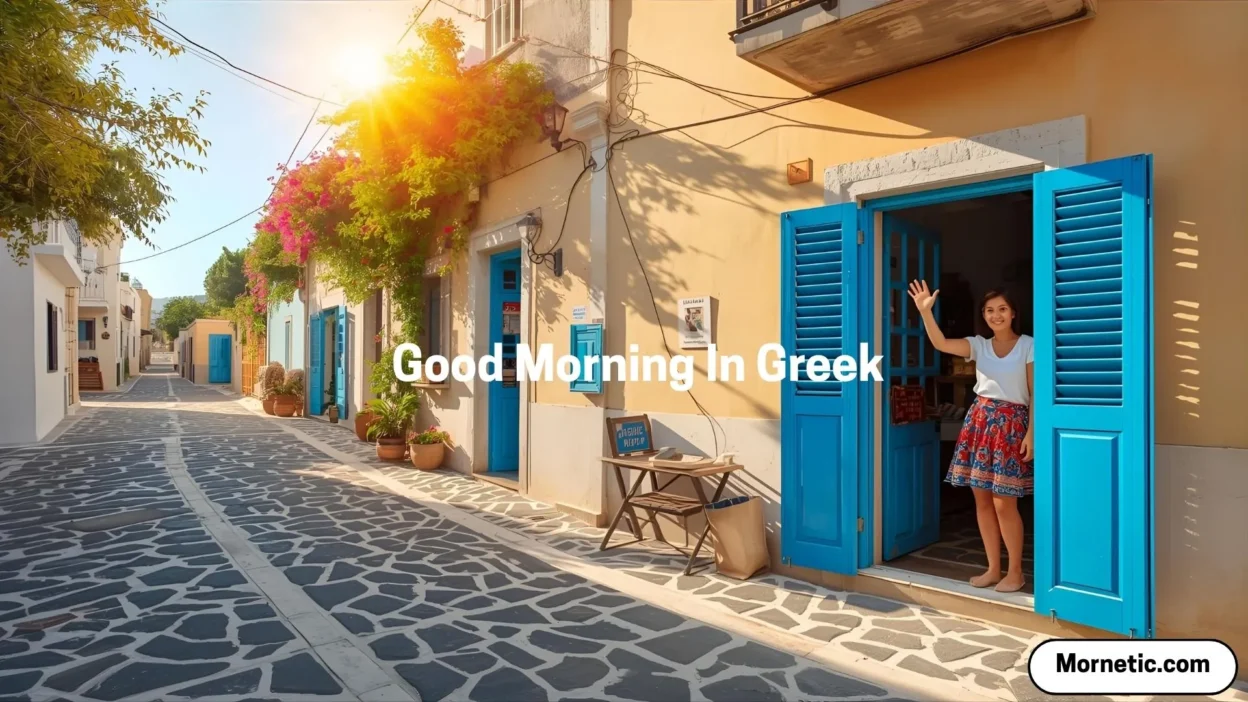Waking up in Greece is a magical experience. For instance, the sun shines brightly on the whitewashed buildings, the scent of the sea fills the air, and the sound of bustling cafés begins to hum. Imagine being part of that scene, ready to greet the day and the people you meet not as a silent tourist, but rather as someone who makes a genuine connection. Ultimately, it all starts with one simple, powerful word: Kaliméra!
Therefore, learning how to say “good morning” in Greek is your first key to unlocking a warmer, more authentic travel experience. In other words, it’s a small effort that shows respect and consequently opens doors to incredible hospitality. In this guide, we won’t just teach you the words; instead, we’ll dive into the pronunciation, the cultural nuances, and all the other essential greetings you need to navigate your day in Greece like a local. So, get ready to say “yassou” to confidence and “efcharistó” for this helpful guide! Let’s begin.
The Heart of a Greek Morning: Understanding ‘Kaliméra’
“Kaliméra” (Καλημέρα) is the beautiful word you’ll use to wish someone a good morning in Greece. But it’s more than just a translation; in fact, it’s a cultural handshake. To clarify, breaking it down helps you understand its soul. Specifically, it comes from two ancient Greek words: “kalós” (καλός), meaning “good” or “beautiful,” and “iméra” (ημέρα), meaning “day.” Therefore, you are literally wishing someone a “good day” or a “beautiful day.” As a result, isn’t that a lovely way to start your morning?
Furthermore, using “Kaliméra” correctly is simple, but getting it right will make all the difference. Typically, you can use it from the moment you wake up until around midday. Moreover, it’s appropriate for anyone—from the hotel receptionist and the café owner to a stranger you pass on a quiet path. In summary, it’s your all-purpose, friendly, and respectful morning greeting.
Here is a quick bullet-point guide to mastering “Kaliméra”:
- Spelling: Καλημέρα (Greek) / Kaliméra (English phonetic spelling).
- Pronunciation: kah-lee-MEH-rah 🗣️. Most importantly, the stress is on the third syllable, “MEH.” So, say it with a smile!
- When to Use: From sunrise until approximately 12:00 or 1:00 PM.
- Formality: It works in both formal and informal situations.
- Response: The most common and polite response is to simply say “Kaliméra” back!
- To One Person: “Kaliméra, Kyrie” (to a man) or “Kaliméra, Kyria” (to a woman) adds a formal “Mr.” or “Mrs.”
- To Many People: “Kaliméra sas” (Καλημέρα σας) is the formal or plural version.
- With a Smile: Always pair it with a warm smile and friendly eye contact.
- In a Café: For example, you’ll often say “Kaliméra” when entering a shop or café before placing your order.
- Cultural Tip: Additionally, it’s often followed by “Ti kánete?” (How are you?) in conversations.
In conclusion, pronouncing “Kaliméra” correctly shows you care. Therefore, don’t be shy to practice it a few times. Fortunately, Greeks are famously hospitable and will absolutely appreciate your effort, even if your accent isn’t perfect. After all, they love when visitors try to speak their language!
Now that you’re a “Kaliméra” expert, let’s see how it fits into the rest of the Greek day. Ultimately, understanding the flow of daily greetings will make you feel even more confident and integrated during your stay.
Navigating the Greek Day: Kalimera vs. Kalispera
The Greek language has a beautiful, time-sensitive rhythm for greetings. Just as you wouldn’t say “good morning” at dinner time in English, Greeks use specific phrases for different parts of the day. Specifically, the two most important ones to know are “Kaliméra” and “Kalispera.” Consequently, knowing the difference is crucial for sounding like a savvy traveler and not making a funny social faux pas.
Essentially, think of the Greek day as being divided into two main greeting zones: the morning/daytime and the afternoon/evening. “Kaliméra” is your go-to for the first half of the day. As the sun starts to dip and the day transitions into evening, it’s time to switch your greeting. This is where “Kalispera” (Καλησπέρα) enters the scene. By definition, it means “good evening” and is used from the late afternoon onwards, typically starting around 5:00 or 6:00 PM.
Here’s a clear breakdown to help you master the transition:
- Kaliméra (Kah-lee-MEH-rah): Your morning and daytime greeting. In other words, use it from dawn until roughly midday or early afternoon.
- The “Gap” Hours: Between about 1:00 PM and 5:00 PM, you can sometimes hear “Kalo Mesimeri” (Good midday), but it’s less common. However, “Kaliméra” still works fine during this transition.
- Kalispera (Kah-lee-SPEH-rah): Your official evening greeting. Therefore, use it from late afternoon through the night until you part ways or go to sleep.
- Pronunciation Difference: Notice the stress moves from “MEH” in Kaliméra to “SPEH” in Kalispera.
- Same Formality Rules: Like “Kaliméra,” “Kalispera” can be used formally and informally.
- Evening Arrival: For instance, use “Kalispera” when entering a restaurant for dinner or meeting friends for an evening drink.
- Plural/Formal: “Kalispera sas” (Καλησπέρα σας) is the formal or plural version.
- The Final Greeting: When it’s time to say goodbye for the night or go to sleep, you use “Kalinychta” (Καληνύχτα), meaning “good night.”
In summary, understanding the “Kalimera vs. Kalispera” dynamic is a cornerstone of basic Greek communication. As a result, it shows you’re attentive to the culture and not just reciting memorized phrases. Ultimately, it’s a simple switch that demonstrates respect for local customs.
Beyond Good Morning: A Toolkit of Essential Greek Greetings and Phrases
While “Kaliméra” is your essential starter, your Greek communication toolkit shouldn’t end there. Therefore, learning a few more key phrases will transform your interactions from simple greetings to meaningful, albeit basic, conversations. In fact, Greeks light up when visitors use their language, and each new word you learn is a bridge to a friendlier experience.
Essentially, think of these phrases as the supporting cast that makes your “Kaliméra” even more powerful. For example, you can use them to say hello more casually, ask how someone is, express gratitude, and politely say goodbye. In conclusion, this small collection of words will cover about 90% of your daily interactions as a traveler and make you feel much more at home.
Here is your essential toolkit of Greek greetings and polite expressions:
- Yassou (Γειά σου): The informal, all-purpose “hello” or “goodbye.” Specifically, use it with people your age or younger in casual settings.
- Yassas (Γειά σας): The formal or plural version of “hello” or “goodbye.” Therefore, use it with older people, strangers, or groups to show respect.
- Efcharistó (Ευχαριστώ): This means “Thank you.” Unquestionably, it’s one of the most important words to know.
- Parakaló (Παρακαλώ): A magical word that means “Please,” “You’re welcome,” or “I beg your pardon?”
- Signómi (Συγγνώμη): Means “Excuse me” or “I’m sorry,” which is useful for getting attention or apologizing.
- Ne (Ναι) / Ochi (Όχι): The vital “Yes” and “No.”
- Ti kánete? (Τι κάνετε;): The formal “How are you?”
- Ti kánis? (Τι κάνεις;): The informal “How are you?”
- Kalinychta (Kah-lee-NEEH-tah): As mentioned, this is “Good night,” used when parting at night or going to bed.
- Kaló taxídi (Καλό ταξίδι): Means “Have a good trip!” – a lovely thing to say to someone traveling.
In summary, memorizing these common Greek sayings is incredibly rewarding. For instance, practice saying “Efcharistó” when your waiter brings your food, or “Yassas” when you enter a small shop. Ultimately, these small actions are the essence of respectful travel. They show you see Greece not just as a backdrop for your photos, but as a living culture with its own beautiful language.
The Ripple Effect: Benefits of Using Greek Greetings Respectfully
You might wonder, “Why bother learning these phrases when most people in tourist areas speak English?” The answer is simple: the benefits go far beyond basic communication. In fact, using “Kaliméra” and other Greek words respectfully is a powerful gesture that transforms your travel experience from a passive vacation into an active cultural exchange. It’s the difference between being an observer and being a participant.
When you make the effort to use the local language, you are essentially showing respect for the country and its people. You are saying, “I value your culture enough to learn a small part of it.” Consequently, this attitude is rarely lost on locals. In a country known for its incredible “philoxenia” (friendliness to strangers), your small effort is often repaid with overwhelming kindness, better service, and more genuine interactions.
Let’s explore the concrete benefits you’ll experience:
- Warmer Welcomes: You will receive much bigger, genuine smiles when you greet people in their own language.
- Better Service: Shopkeepers, waiters, and hotel staff often go the extra mile for guests who show cultural respect.
- Deeper Connections: It can be the icebreaker that leads to a friendly conversation or a local recommendation you wouldn’t find in a guidebook.
- Increased Confidence: Navigating daily situations becomes easier and more enjoyable when you can communicate on a basic level.
- Cultural Insight: Language is a window into a culture’s soul. Therefore, using these phrases helps you understand the Greek way of life better.
- Avoiding the “Ugly Tourist” Label: It immediately sets you apart as a conscientious and respectful visitor.
- Enhanced Safety: Being able to use basic polite phrases can be helpful in unexpected situations.
- Personal Satisfaction: There’s a unique joy and sense of achievement in successfully communicating in a new language.
- Supporting Preservation: Your interest shows that the Greek language is valued by the world, thus supporting its cultural preservation.
In conclusion, the impact of a simple “Kaliméra” is profound. Not only does it humanize you to the locals, but it also transforms you from just another tourist into a welcomed guest. This is the true magic of learning basic Greek words for your trip. As a result, it enriches your journey, making it more personal, memorable, and meaningful. Ultimately, the barriers come down, and the real Greece opens up to you.
Conclusion: Your Greek Language Journey Starts with ‘Kaliméra’
And there you have it! Your comprehensive guide to saying “good morning” in Greek and so much more. Now, you know that “Kaliméra” is your sunny key to the first half of the day, and “Kalispera” gracefully takes over as the evening begins. Furthermore, you’re equipped with a toolkit of essential Greek phrases like “Yassas,” “Efcharistó,” and “Parakaló” that will help you navigate your travels with confidence and respect.
Remember, the goal isn’t fluency. Rather, the goal is connection. So, don’t worry about perfect pronunciation; after all, your effort is what truly counts. In essence, every “Kaliméra” you offer is a nod of respect to the rich Greek culture and its warm-hearted people. It’s a small step that leads to bigger smiles, warmer interactions, and a travel experience you’ll cherish forever.

Grace is a lifestyle writer from California who loves starting mornings with positivity. At Mornetic, she shares uplifting quotes and cheerful messages to brighten your day.




